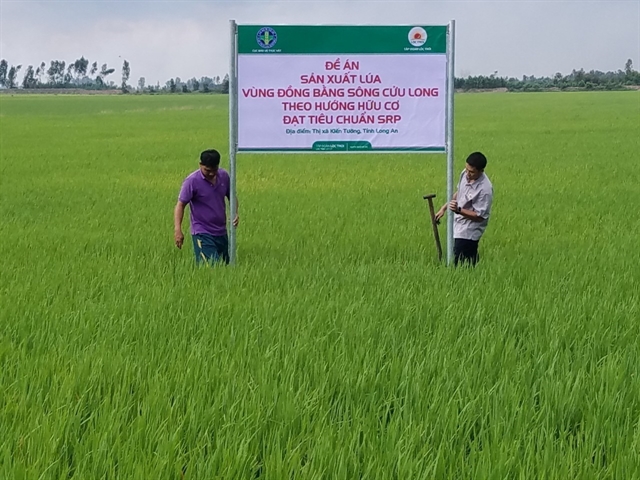 Society
Society

The Cửu Long (Mekong) Delta province of Long An seeks to create close ties between producers and consumers of its major agricultural items, the director of its Department of Agriculture and Rural Development has said.

|
| Lộc Trời Group Joint Stock Company grows organic rice in Long An Province. — VNA/VNS Photo |
LONG AN — The Cửu Long (Mekong) Delta province of Long An seeks to create close ties between producers and consumers of its major agricultural items, the director of its Department of Agriculture and Rural Development has said.
The items include rice, dragon fruit, vegetables, lemon, poultry, cows, tra fish and shrimp, Nguyễn Thanh Truyền said.
To achieve this, farmers, co-operatives and companies will get 100 per cent reimbursement of the cost of consulting, signing contracts and creating production and market development plans up to VNĐ300 million (US$12,920).
Besides, they will get 30 per cent subsidy for buying equipment and building infrastructure such as plants, warehouses and other facilities up to VNĐ3 billion ($129,250).
The province will subsidise the cost of seeds and other inputs, packaging and labels for up to three crops or three production cycles.
They will get 50 per cent subsidy for seeds and 30 per cent for fertiliser, chemicals and food.
In the case of rice cultivation, for instance, the subsidy for seeds and other inputs is VNĐ4 million ($172) per hectare per crop and VNĐ600 million ($25,850) for a rice production project.
The subsidy for acquiring and applying new advanced techniques and quality management is 40 per cent with a limit of VNĐ1 billion ($43,090).
In recent years, the province has encouraged farmers to become members of co-operatives and sign contracts with companies to guarantee outlets for their produce.
Vũ Tuấn, a rice farmer and a member of the Gò Gòn Co-operative in Tân Hưng District, said co-operatives enable farmers to earn higher incomes and help them with farming techniques, seeds and harvesting.
Members can earn VNĐ3-5 million ($129-215) per hectare of rice more than normal farmers, he said.
Trương Hữu Trí, director of the Gò Gòn Co-operative, said the co-operative has 103 members with a total of 464ha of farmlands, mostly paddies.
In the 2018-19 winter-spring crop, the co-operative signed a deal with a company to sell 300ha of rice grown to global good agricultural practice (Global GAP) standards, he said.
Tying up with companies is imperative for co-operatives to improve their competitiveness and guarantee a market for their produce, he said.
This model of co-operation between farmers, co-operatives and companies is the most effective one for producing, processing and consuming agricultural produce, according to the department.
The province has also implemented several measures to help farmers achieve Vietnamese and global good agricultural practices standards.
It has co-operated with other provinces and cities to promote its agricultural produce, especially to sell them through modern channels like supermarkets and clean produce shops. — VNS




